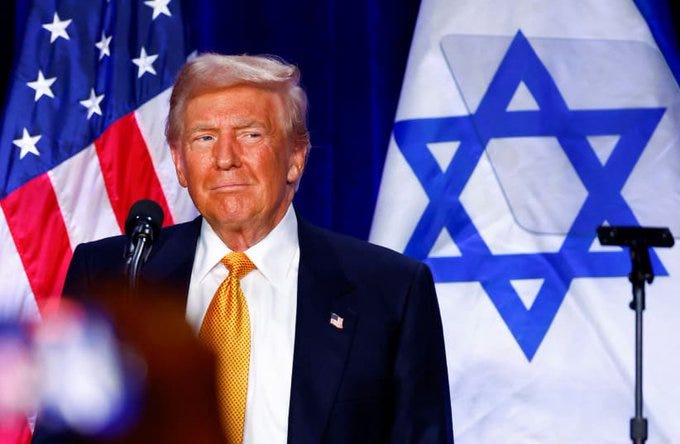Trump continues with what appears to be his “baffle ‘em with bullshit” approach to geopolitical deal making. So far the deal making hasn’t actually begun, meaning, so far no negotiations on the big issue areas—just pressure on Denmark re Greenland. Today Alastair Crooke has a relatively brief substack that raises the issue of what exactly Trump is trying to accomplish. He does so in a slightly provocative way:
Larry Johnson riffs off Crooke’s piece—explicitly:
For now I’m going to stick with my previous view, which begins from the premise that Trump’s geopolitics must be viewed from the standpoint of his MAGA agenda—the focus of which is on domestic politics and how the average American views American Greatness. The average American has little to no interest in geopolitics. Trump knows this, and that means that he fully understands that his foreign policy will only be successful for him if it supports his domestic policy. Major wars that yield no clear results are nothing but a nuisance for a US president—at best. Look at the signature event for the Zhou “presidency”—the debacle of the Afghan withdrawal. Far from clearing the foreign policy deck for other matters—Green New Deal, etc.—that disaster set the tone for Zhou’s entire “presidency.” Nothing ever got better.
Trump needs a deal and he needs it badly—that’s a bedrock conviction—but he can’t afford a deal that makes him look like a loser. Doing a deal with Putin would be easy—Putin has set out the terms in advance and those are terms that, rationally speaking, America can easily live with. The hard part is that any deal has to be a deal that looks like a win for America and Trump. The American mindset tends to view a win win or a tie as a loss. That makes things awkward when you’re dealing from a position of weakness—as Trump is.
Crooke hits on a key issue for understanding Trump when he twice uses the word “narrative”. Trumpian politics is all about constructing narratives, starting with MAGA. The magic in this is Trump’s way of framing narratives that allows Americans to largely interpret his basic narrative in ways that appeal to them. What Crooke misses is that, even when Trump is presenting narratives to foreign leaders, the real audience—more often than not—is domestic, not the foreign leaders themselves.
Nowhere is this more apparent than in the way Trump presents his narratives by inventing his own facts (cf. What's Trump's Game With Putin?), of when he adopts “facts” put out by the American Deep State that are, in fact, falsehoods. Crooke is concerned that Trump is risking offending his foreign interlocutors to the point that they will refuse to talk to him. But then, as I pointed out (in the linked article), Trump injects enough realism into his narratives to ensure that Putin and the Russians wont be entirely turned off. And both Crooke and LJ ultimately come down on my side (and Chas Freeman’s): They both agree that the Russians will talk to Trump.
What’s going on here is that Trump needs to cover all contingencies. One of those contingencies is that Putin will listen to Trump’s offer and simply blow him off. And so Trump tells Americans that it’s all up to Putin: ‘Hey, I’m trying to do him a big favor, but maybe he won’t accept that.’ That line isn’t addressed to Putin—it’s directed to Americans to prepare them for the ‘it’s not my fault that there wasn’t a deal’ contingency. Crooke rightly maintains, as I have, that it simply isn’t plausible that Trump really believes the fake intel the Deep State is still presenting him with. His invented facts are part of the prep work to cover his domestic behind if things go south and there’s no deal. But Trump is also hinting to both Putin and the American public that there could be a deal sweetener—let’s do a really big deal, including some sort of nuclear arms control part to the deal. No specifics, but it attracts the American public’s interest, presents Trump as a peace loving guy, and interests Putin.
Trump has spent most of his life constructing deals, and he knows a thing or two about deal making. First of all, he knows that he has to do his homework—he needs a firm grasp on all the essential facts. He can’t go into a serious meeting with a crucial deal on the line and try simply BS his way through. That’s why the idea that the Deep State has Trump eating fake facts out of their hand is implausible. Trump knows from personal experience that he can’t trust the Deep State and he knows where to go to get a more impartial assessment. As matters stand now, it’s not the right time to admit to America that he has a losing or weak hand by presenting the real facts about the war. That time may come if Trump needs a scapegoat at some point, which is when he’ll dump on Zhou, dump on Zhou’s Deep State, tout his own crew of Tulsi and Ratcliffe for finally getting him the true facts, etc. But now is not that time.
The second thing Trump knows about deal making is that it’s almost always best if the other side gets something out of the deal. That’s Trump’s big problem in trying to do a deal with Putin. Trump has very little to offer Putin that Putin can’t get on his own terms. Nor, for example, does Putin fear Trump’s attempt to play at using the Chinese to pressure Putin. But the suggestion of a nuclear aspect to a Ukraine deal should intrigue Putin because any sort of arms control package would appeal to Putin’s own public. That’s the sweetener that Trump can offer Putin—the ability for Putin to justify the blood and treasure that was expended because it led to more than just victory in Ukraine. It led to a more secure future in a bigger way.
So for right now I remain cautiously optimistic with regard to Trump’s ability to come up with some sort of deal with Putin that may prove acceptable to most Americans. Above all, Trump really needs a deal, and he knows deal making. If that means convincing Putin to help America to save face, I think that’s entirely doable—as long as Putin gets his bottom line.
Turning to the Middle East, we see a somewhat similar situation. The bottom line at this point—at least to all appearances—is that Trump faced down Netanyahu and forced a humiliating ceasefire in Gaza. Could this have been staged, for political purposes? It’s hard to see that, for the reason I’ve repeatedly presented. By coercing Netanyahu—even if only apparently—Trump has basically taken ownership of any renewal of the Israeli genocide. The rest of the world will, rightly, ask: If Trump could coerce Netanyahu before, why can’t he do it again? And, of course, Trump could do it again—even he weren’t in the pocket of Netanyahu’s Israel Lobby. That’s the inevitable perception, so it would seem that Trump has positioned himself way out on a limb.
So what’s going on now? Well, we’re getting the same sort of “baffle ‘em with bullshit” stuff as with Russia. The difference is that Trump appears to believe he’s dealing from a position of strength. Having exerted himself to force a ceasefire, Trump is now saying things like, ‘I don’t expect it to last,’ and ‘It’s their [Israel’s] war, not ours.’ None of which makes a lot of sense if Trump is able to turn the war off and on, as we seem to have seen. The latest is even more disturbing:
BREAKING: Trump greenlights 2,000-pound bombs to Israel - reversing Biden's hold despite his ban for foreign aids, including military - Axios
Well! That got results—Trump taught Netanyahu some minimal manners:
Megatron @Megatron_ron
BREAKING:
 Netanyahu thanked Trump for continuing to arm Israel.
He even called the opponents "common enemies."
"Thank you President Trump for keeping your promise to give Israel the tools it needs to defend itself, to confront our common enemies and to secure a future of peace and prosperity"
But now we seem to be seeing a Zhou rerun solution:
JUST IN: Trump says he is pressuring Jordan and Egypt to take in Palestinians from Gaza, as a plan to "just clean out" the territory — AP
"I spoke with the King of Jordan about the possibility of transferring Gazans to neighboring countries"
"I told him to take more people because the Gaza Strip is in a real mess. I want Egypt to take in people too, and I will talk to Al-Sisi tomorrow"
So, “it’s their war” but America will pressure Jordan and Egypt to help us do the ethnic cleansing for Israel. Now we know why foreign aid to Egypt wasn’t suspended. Nor to Israel:
Sanctions and aid cutoff if Egypt doesn’t comply?
I don’t see a good ending here. The region and the world has has changed since Trump was last president. The problem is, the Anglo-Zionists are refusing to change and could take Trump down.








Saw the headline this morning about relocating the people from Gaza to Egypt and Jordan. I’m not too clear on my history, but I believe that both Egypt and Jordan had terrible issues with displaced Palestinians in the past. They don’t want them. It will create incredible instability within their own countries and become a threat to their own governments. What could possibly be in it for them to help out Israel like that?
Has anyone speculated that Trump repeating war propaganda is about getting Tulsi Gabbard as his DNI? What I mean is: what would happen if Trump said what all the "Putin sympathizers" want him to say? There would be massive media storm calling Trump a Putin Symp, a traitor, an anti-American, stupid, easily duped etc. Then they would go even harder against Tulsi because they are already doing that to her, they would call them two peas in the dictator loving pod--and it would be blasted non-stop not only in the American and Euro liberal media, but also by bot farms on social media. He can avoid that by simply repeating their propaganda, it makes sense as a practical measure for now.